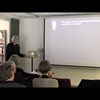naturen
The nature and dangers of conspiracy theories
(This is a closed workshop) Program: Karen Douglas, 10.00-11.15, “The psychology of conspiracy theories”. Daniel Cohnitz, 11.15-12.30, “Conspiracy Theory Reconsidered: Generalism vs Particularism” Sandwic
Thomas Christiano: The Tension between the Nature and the Norm of Voluntary Exchange
Thomas Christiano, Professor of Philosophy at the University of Arizona ABSTRACTI argue we can make a great deal of progress in understanding the promise and the perils of voluntary exchange by elabora

Implicit Mind: Is there a joint in nature between perception and cognition? with Ned Block
Recording from the Implicit Mind Workshop at the Institute for Futures Studies in Stockholm, May 2015.
Completed: Firms as Political Activists: The Scope and Nature of Corporate Political Responsibility
This project explores the changing political role of corporations in the 21st century by combining political science, sociology, and business science.
Do we need dual-process theory to understand implicit bias? A study of the nature of implicit bias against Muslims
in: Poetics AbstractPsychological dual-process theory has become increasingly popular among sociologists. The dual-process framework accounts for two types of thinking; a fast, associative, automatic o

Ambivalence: A new unified theory about its nature, grounds, and application to normative conflicts
Having mixed feelings about something can help us to deal with conflicts. Since this view on ambivalence challenges traditional approaches that see ambivalence as a flaw, this project aims to develop a new theory of ambivalence.

Globala katastrofer och existentiella risker. Intervju med Anders Sandberg
Kärnvapenkrig, pandemier, istider och robotar smartare än människan. Både naturen och vi själva kan försätta oss i situationer där mänskligt liv hotas på en större skala. Här intervjuas forskaren Ande
Learning the Natural Numbers as a Child
Noûs 53 (1), 3-22 Abstract How do we get out knowledge of the natural numbers? Various philosophical accounts exist, but there has been comparatively little attention to psychological data on how the lea
Are the Natural Numbers Fundamentally Ordinals?
Philosophy and Phenomenological Research 99 (3), 564-580 Abstract There are two ways of thinking about the natural numbers: as ordinal numbers or as cardinal numbers. It is, moreover, well‐known that the
Laura Valentini: There Are No Natural Rights: Rights, Duties and Positive Norms
Laura Valentini, Associate Professor of Political Science at London School of Economics ABSTRACTMany contemporary philosophers—of a broadly deontological disposition—believe that there exist some pre-i. In this paper, I defend this unpopular view. I argue that all rights are grounded in —namely, norms constituted by the collective acceptance of gives “oughts”—, provided the norms’ content meets some independent standards of moral acceptability. This view, I suggest, does justice to the relational nature of rights, by explaining how it is that right-holders acquire the authority to demand certain actions (or omissions) from duty-bearers. Furthermore, the view does not divest human beings of fundamental moral protections. Even if, absent some rights-grounding positive norms, obligations cannot be to others, we still have (non-directed) placing constraints on how we may permissibly treat one Another.








